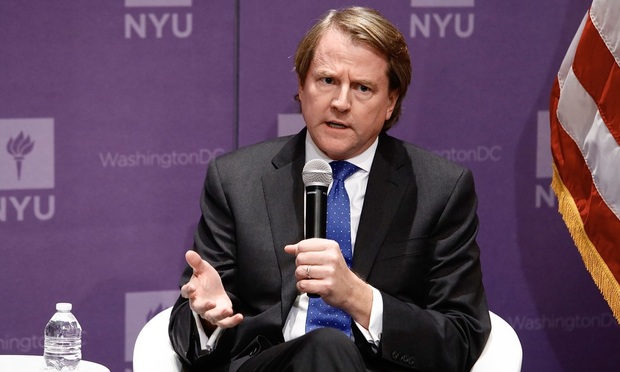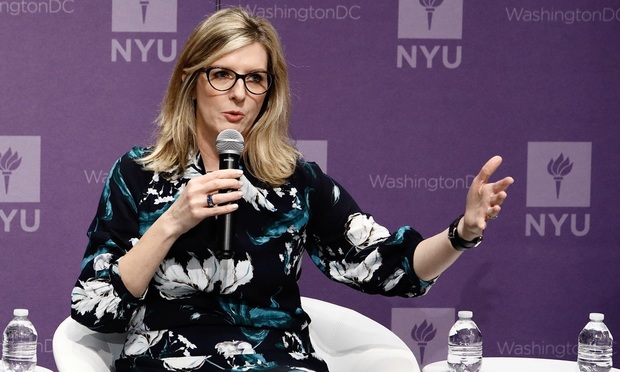White House Counsel Isn't 'Personal Lawyer' to President, McGahn Asserts
Donald McGahn spoke with Obama-era White House counsels Kathryn Ruemmler and Bob Bauer in Washington on Thursday about the challenges facing the role.
December 12, 2019 at 07:16 PM
6 minute read
 Donald McGahn speaking in Washington on Dec. 12. Credit: Diego M. Radzinschi / ALM
Donald McGahn speaking in Washington on Dec. 12. Credit: Diego M. Radzinschi / ALM
Inside the White House, Donald McGahn personally took part in episodes Special Counsel Robert Mueller III scrutinized as part of an investigation into whether President Donald Trump sought to obstruct the Russia investigation. Outside the White House, he has found himself in litigation with the House, resisting a subpoena for his testimony in the impeachment process.
It has all made McGahn, the former White House counsel, among the most fascinating figures in the Trump era.
On Thursday, in rare public remarks, McGahn steered clear of the drama that has swirled around him, instead speaking broadly about his view of the White House counsel's role while recounting the occasional arm-twisting that came with congressional dealings, including his aggressive quest to shape the federal judiciary.
Appearing at the fourth annual Sidley Austin Forum alongside a pair of former Obama White House counsels—Bob Bauer, a professor at the New York University School of Law, and Latham & Watkins partner Kathryn Ruemmler—McGahn stressed that his former Trump administration role was to represent the institution of the presidency and protect executive authority.
"It's not a personal lawyer," he said.
Later, McGahn said the White House counsel's role is to "represent the president's views."
"No question about it—not be a check on his views or say, 'Well, you know, the Senate really thinks that it has a larger role than you think, sir.' No, that's not your job at all. You're a lawyer for the president."
McGahn rejoined the law firm Jones Day in March after stepping down in late 2018 as Trump's White House counsel. His successor, Pat Cipollone, has spearheaded the White House's refusal to cooperate with the House impeachment inquiry, penning letters—widely derided as "barely lawyered"—that have criticized Democrats and asserted that they "seek to overturn the results of the 2016 election and deprive the American people of the president they have freely chosen."
For his part, McGahn is still involved in the broader Trump stonewall effort, having obeyed the president's command not to speak with House Democrats as part of the impeachment process. In early January, the U.S. Court of Appeals for the D.C. Circuit will take up the House effort to enforce a subpoena targeting McGahn. He's represented in that case by William Burke of Quinn Emanuel Urquhart & Sullivan.
McGahn enjoyed Republican majorities in the House and Senate during his nearly two-year tenure, a stretch in which he oversaw the Trump administration's deregulatory agenda and frenzied push to fill vacancies on the federal bench, including a pair of Supreme Court seats.
On Thursday, McGahn underscored the White House counsel's view that the president is the "ultimate decisionmaker" for judicial nominations, downplaying the role of individual senators in those selections.
"Now I'm back to representing many of these senators, so they're going to hate when I say this, but I have to get in trouble with somebody here today," he said.
McGahn's relationship with Trump grew fraught after then-Attorney General Jeff Sessions refused to recuse—against the president's wishes—from the Russia investigation. Later, the two clashed after Trump asked him to fire Mueller, with the president backing down only after McGahn threatened to resign. McGahn would become a key witness in the Mueller probe.
On Thursday, McGahn said that, "if anything, I'm known for a sort of mutual candor with clients," but made no clear reference to his cooperation with the Mueller probe or pushback against Trump.
McGahn and Ruemmler spoke of the frustrations that can come with congressional interactions, particularly for those entering the White House counsel's role from the executive branch.
 Kathryn Ruemmler speaking in Washington. Credit: Diego M. Radzinschi/ ALM
Kathryn Ruemmler speaking in Washington. Credit: Diego M. Radzinschi/ ALMRuemmler, who came to the Obama White House from the Justice Department, said her executive branch experience made her "very much used to dealing with, you know, facts," drawing laughter from the crowd. She said dealings with Congress could be "absolutely maddening," recounting a conversation with a U.S. senator who at once praised but refused to support an Obama judicial nominee.
Her comment sparked an animated exchange, with McGahn saying how he would have pushed to flip the senator's stance.
"I guess that's where I'm different. I would have said, 'That's what you think today.'"
"You didn't need 60 votes, thank you very much," Ruemmler responded, referring to a Senate rule at the time requiring 60 votes to confirm judicial nominees. Former Sen. Harry Reid eventually struck the rule, deploying the so-called "nuclear option" in the face of Republican filibustering of Obama nominees.
"That's correct. … Thank you, thank you Sen. Reid for that one," McGahn said. (Ruemmler said Senate Majority Leader Mitch McConnell, a Kentucky Republican, "would have changed the rules in a second" if he were in the same position.)
McGahn said later that, in his interactions with lawmakers, he would take what he termed a "I know how to get your vote" mindset.
"I came at it from much more of that point of view, particularly dealing with senators on confirmation issues, because that's not polite tea with the queen," he said. "That tends to be raw, who-has-the-most-votes wins kind of stuff, so you have to think that way."
This week, Trump secured his 50th federal appeals court appointee, after the Senate confirmed Lawrence VanDyke to a seat on the San Francisco-based U.S. Court of Appeals for the Ninth Circuit.
Read more:
'No One Is Above the Law': Judge Says McGahn Must Comply With House Subpoena
Ex-Big Law Attorneys Stock Trump White House Counsel's Office
McGahn Once Said He Represented 'Pictures on the Wall,' Not Trump
Don McGahn Said Trump Was 'Testing His Mettle' Over Possibly Firing Mueller
This content has been archived. It is available through our partners, LexisNexis® and Bloomberg Law.
To view this content, please continue to their sites.
Not a Lexis Subscriber?
Subscribe Now
Not a Bloomberg Law Subscriber?
Subscribe Now
NOT FOR REPRINT
© 2025 ALM Global, LLC, All Rights Reserved. Request academic re-use from www.copyright.com. All other uses, submit a request to [email protected]. For more information visit Asset & Logo Licensing.
You Might Like
View All
Trump Administration Faces Legal Challenge Over EO Impacting Federal Workers
3 minute read
US Judge Cannon Blocks DOJ From Releasing Final Report in Trump Documents Probe
3 minute read
Private Equity Giant KKR Refiles SDNY Countersuit in DOJ Premerger Filing Row
3 minute readLaw Firms Mentioned
Trending Stories
- 1SurePoint Acquires Legal Practice Management Company ZenCase
- 2Day Pitney Announces Partner Elevations
- 3The New Rules of AI: Part 2—Designing and Implementing Governance Programs
- 4Plaintiffs Attorneys Awarded $113K on $1 Judgment in Noise Ordinance Dispute
- 5As Litigation Finance Industry Matures, Links With Insurance Tighten
Who Got The Work
J. Brugh Lower of Gibbons has entered an appearance for industrial equipment supplier Devco Corporation in a pending trademark infringement lawsuit. The suit, accusing the defendant of selling knock-off Graco products, was filed Dec. 18 in New Jersey District Court by Rivkin Radler on behalf of Graco Inc. and Graco Minnesota. The case, assigned to U.S. District Judge Zahid N. Quraishi, is 3:24-cv-11294, Graco Inc. et al v. Devco Corporation.
Who Got The Work
Rebecca Maller-Stein and Kent A. Yalowitz of Arnold & Porter Kaye Scholer have entered their appearances for Hanaco Venture Capital and its executives, Lior Prosor and David Frankel, in a pending securities lawsuit. The action, filed on Dec. 24 in New York Southern District Court by Zell, Aron & Co. on behalf of Goldeneye Advisors, accuses the defendants of negligently and fraudulently managing the plaintiff's $1 million investment. The case, assigned to U.S. District Judge Vernon S. Broderick, is 1:24-cv-09918, Goldeneye Advisors, LLC v. Hanaco Venture Capital, Ltd. et al.
Who Got The Work
Attorneys from A&O Shearman has stepped in as defense counsel for Toronto-Dominion Bank and other defendants in a pending securities class action. The suit, filed Dec. 11 in New York Southern District Court by Bleichmar Fonti & Auld, accuses the defendants of concealing the bank's 'pervasive' deficiencies in regards to its compliance with the Bank Secrecy Act and the quality of its anti-money laundering controls. The case, assigned to U.S. District Judge Arun Subramanian, is 1:24-cv-09445, Gonzalez v. The Toronto-Dominion Bank et al.
Who Got The Work
Crown Castle International, a Pennsylvania company providing shared communications infrastructure, has turned to Luke D. Wolf of Gordon Rees Scully Mansukhani to fend off a pending breach-of-contract lawsuit. The court action, filed Nov. 25 in Michigan Eastern District Court by Hooper Hathaway PC on behalf of The Town Residences LLC, accuses Crown Castle of failing to transfer approximately $30,000 in utility payments from T-Mobile in breach of a roof-top lease and assignment agreement. The case, assigned to U.S. District Judge Susan K. Declercq, is 2:24-cv-13131, The Town Residences LLC v. T-Mobile US, Inc. et al.
Who Got The Work
Wilfred P. Coronato and Daniel M. Schwartz of McCarter & English have stepped in as defense counsel to Electrolux Home Products Inc. in a pending product liability lawsuit. The court action, filed Nov. 26 in New York Eastern District Court by Poulos Lopiccolo PC and Nagel Rice LLP on behalf of David Stern, alleges that the defendant's refrigerators’ drawers and shelving repeatedly break and fall apart within months after purchase. The case, assigned to U.S. District Judge Joan M. Azrack, is 2:24-cv-08204, Stern v. Electrolux Home Products, Inc.
Featured Firms
Law Offices of Gary Martin Hays & Associates, P.C.
(470) 294-1674
Law Offices of Mark E. Salomone
(857) 444-6468
Smith & Hassler
(713) 739-1250











